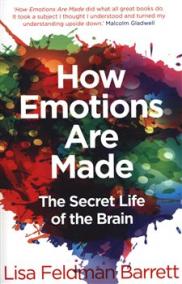How Emotions Are Made
Dátum vydania: 14.05.2018
When you feel anxious, angry, happy, or surprised, what's really going on inside you? Most scientists would agree that emotions come from specific parts of the brain, and that we feel them whenever they're triggered by the world around us. The thrill of seeing an old friend, the sadness of a tear-jerker movie, the fear of losing someone you love - each of these ...
Detaily o knihe
Počet strán: 425
Rozmer: mm
Jazyk: Anglicky
EAN: 9781509837526
Rok vydania: 2018
Zákazníci, ktorí si kúpili túto knihu, si kúpili aj...
O knihe
When you feel anxious, angry, happy, or surprised, what's really going on inside you? Most scientists would agree that emotions come from specific parts of the brain, and that we feel them whenever they're triggered by the world around us. The thrill of seeing an old friend, the sadness of a tear-jerker movie, the fear of losing someone you love - each of these sensations arises automatically and uncontrollably within us, finding expression on our faces and in our behaviour, and carrying us away with the experience. This understanding of emotion has been around since Aristotle. But what if it's wrong? In How Your Emotions Are Made, pioneering psychologist Lisa Feldman Barrett draws on the latest scientific evidence to reveal that our ideas about emotion are dramatically, even dangerously, out of date - and that we have been paying the price. Emotions don't exist objectively in nature, Barrett explains, and they aren't pre-programmed in our brains and bodies; rather, they are psychological experiences that each of us constructs based on our unique personal history, physiology and environment. This new view of emotions has serious implications: when judges issue lesser sentences for crimes of passion, when police officers fire at threatening suspects, or when doctors choose between one diagnosis and another, they're all, in some way, relying on the ancient assumption that emotions are hardwired into our brains and bodies. Revising that conception of emotion isn't just good science, Barrett shows; it's vital to our wellbeing and the health of society itself.












